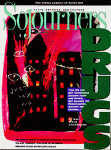Throughout the greater part of this century, the political and military leadership of Western nations seemed convinced that expansionary-minded totalitarian governments posed the most serious threat to American and European democracy. Favored freedoms—the right to vote, to dissent, to pursue one's economic self-interest, and to choose one's lifestyle—were believed to be in constant jeopardy from the regimes of such leaders as Stalin, Hitler, Mussolini, and Mao.
The members of that feared foursome are now all dead. The Soviet Union is no longer one entity. And China, despite the remonstrations of its twentysomething intelligentsia, is currently being wooed by President Bush and the NATO (or New World) cabal. To be sure, the reunification of Germany and open dialogue with the former Soviets and China hardly presage an era of utopian relaxation. Yet the lifting of animosities attending international relations provides ample opportunity to eye an even more formidable threat to freedom on the domestic front. The enemy is now within; and it is television.
In his book Television and the Crisis of Democracy, philosopher Douglas Kellner examines the historical and present-day relationship between democracy and the television industry, delivering a five-chapter study divided into two separate but equally important parts. Part one of the book delivers a well-constructed post-Frankfurt School theoretical analysis that explores the destructive and regressive (and even totalitarian) role television plays in contemporary society. The second part offers its readers a succinct blueprint of the medium's potentials and "alternative" uses.
The tone of Kellner's book is poignantly anti-television. Thus at its epicenter rests this theme: Television serves as an ideological device of the ruling political, cultural, and economic elite; and in the West—particularly in the United States—television's co-option has been systemically used to thwart political participation.
AS A MEDIUM THE television industry (network owners, board members, writers, reporters, TV programmers, agents, directors, and actors) has not only failed to realize its democratic function of "providing the information necessary to produce an informed citizenry," but has exacerbated the "growth of excessive corporate and state power." Kellner begins to flesh out this weighty indictment by constructing a critical theory on television. The television industry is preoccupied with the capitalistic ethos of making money, mo' money, and even still mo' money.
The unique aspect of Kellner's revised Frankfurt School analysis, however, is that its theoretical claims—unlike those of the Frankfurt School—are coupled with ample empirical and anecdotal references. Kellner's prose—also unlike the highly technical writings of the Frankfurt Schoolers—is pedestrian, rendering its conclusions clear to the layreader. The benefits of this solidly documented, jargon-free, lucid style are the book's strong suit.
In fact, Television is filled with data supporting one of Kellner's central positions: The television industry, corporate business, and the Reagan and Bush administrations conjoined in a frontal assault against the functions of democratic government. On this matter, the author provides lengthy accounts of documented evidence ranging from a historical overview of television program content to detailed points on why and how Federal Communications Commission code regulations and anti-trust laws were subverted, relaxed, or eliminated. In fine measure, Kellner also supplies the reader with meticulous explanations of biased and manipulative news coverage.
Still, this is not all this book has to offer. As Kellner carefully makes his case against the television industry, he also manages skillfully to acquaint the reader with the various contending left-wing critiques of the medium. This treatment gives one the sense of conversing with a very literate and competent scholar not at all reticent about discussing the fine points of his intellectual pursuit.
Television concludes with a prescriptive program that calls for an "alternative" vision that would enhance the democratic process. Such alternatives argue for an "accountability, access and adequacy" that range from changing the structure of political advertising so as to allow every presidential candidate free and equal time to address the public, to reconstructing the current public broadcast system so that it moves from its present "paternalistic" model to a more "spectrum-sharing model"; from allowing the general population to vote via a computerized television, to restoring and revising FCC deregulation and anti-trust laws dismantled during the 1980s.
Kellner's belief that the elite who control the TV industry actually meet in a closed-room conspiracy to map out their day-to-day plans for subverting democracy is the book's one flaw. This may be true, but it's unlikely. Regardless, he does not document it, so it rings a bit paranoid.
Otherwise, Television is a remarkable book, providing insight into why democracy is failing. It is rich in detail and will stand as a milestone in political and media research.
Television and the Crisis of Democracy. By Douglas Kellner. Westview Press, 1990.

Got something to say about what you're reading? We value your feedback!